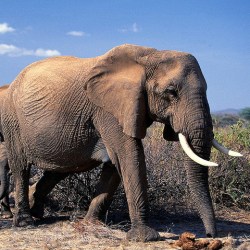African Elephants Could Become Extinct Within Decades

At a recent conservation summit held in Botswana, experts warned that the African elephant could become extinct in the wild in just a few decades. Conservationists were highlighting the terrible fact that wild elephant numbers have declined due to demand for ivory resulting in an increase in poaching. If this magnificent species is to survive for future generations, then there is much work to be done because it would be a real tragedy if we lost the African elephant.
High demand for ivory
Delegates from over 20 countries participated in the African Elephant Summit. Delegates came from countries in Asia, Africa and Europe including China which is the main country accused of fuelling demand for ivory. The high demand for ivory in China is the main reason why elephant poaching is rising on the African continent.
We may lose the elephant
Dune Ives a senior researcher with Vulcan, the philanthropic division of US billionaire Paul Allen’s family office reckons that it is possible the African elephant could become extinct within our lifetimes. He goes on to add that within five years it is quite conceivable that we lose the opportunity to save the iconic African elephant.
Numbers are falling
According to the latest data from the International Union for Conservation of Nature, the number of wild African elephants has fallen from 550,000 in 2006 to 470,000 in 2013. The worst decline was experienced in East Africa, which saw the wild elephant population drop from 150,000 to 100,000 over the same time period.
Criminal networks
The illegal poaching of elephants is usually organised by international criminal networks which seek to establish a supply of ivory to mainly Asian markets. Some of the profits are used to fund regional conflicts and experts say the syndicates take advantage of poor governance, social unrest and conflicts.
Final destination China
According to TRAFFIC a group which monitors the wildlife trade, ivory trading routes flow from Tanzania and Kenya, through transit countries such as the Philippines and Vietnam before ultimately arriving at final destinations such as Thailand and China. At the final destination, ivory is then sculpted into art or jewellery to be sold on to the wealthy.
“Thailand is still a country of great concern, (But) China is the most important country that we are dealing with in the world with respect to illegal ivory trade.”
Chinese say they are trying to help
Delegates to the conference said that during a closed discussion, one Chinese delegate complained that the country was being targeted unfairly and instead should be thought of as an ally in the fight against illegal poaching. The delegate went on to add that China spends a lot of money to finance anti poaching activities in Africa and is bolstering legislation.
The conference follows on the heels of a meeting which took place in 2013 where over 30 countries agreed to adopt a set of urgent conservation measures such as calling for better criminal prosecution and agreeing to unite against poaching.



